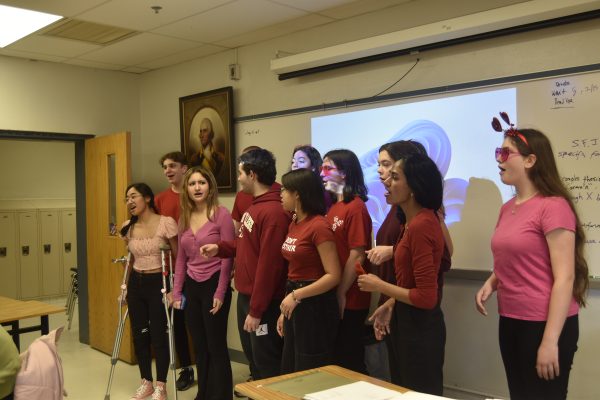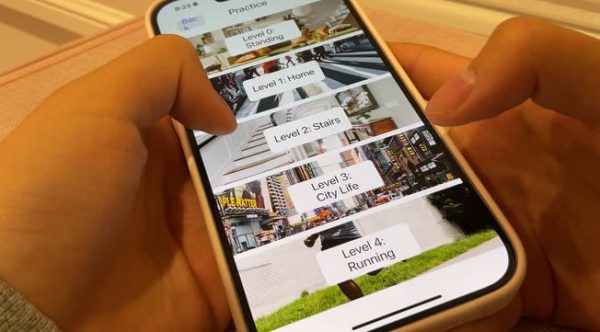A living battlefield
A student shares her story on what it’s like to live with epilepsy

Storyteller — Abt recalls her past with epilepsy. She tells of how she dealt with it at such a young age. (Photo by Cc)
February 8, 2019
Being able to freeze time and live in a moment forever seems perfect until it’s out of your control. Freshman Linnea Abt’s body captures her in what feels like a never-ending moment. Lightheaded and dizzy, she snaps out of a daze, desperately grasping onto her memory as it slips through her fingers.
When Abt thinks of the second grade, the first thing to come to mind isn’t coloring books and times tables. Instead, she recalls when she was diagnosed with epilepsy. The disorder triggers seizures due to a disruption in nerve cell activity in the brain.
“In elementary school, everyone had these good grades and I was just falling behind completely,” Abt said.
Abt’s mom’s concerns drove her to take her daughter in to the doctor’s office in May of 2011 to get tested. After ruling out potential issues they came to the conclusion that she had epilepsy but were unaware of when it had developed.
“She had seizures probably once an hour every hour of her day back in second grade, but because they weren’t the ones where she would fall to the ground and instead go into a daze, we never really knew,” said Gunilla Abt, Linnea’s mom.
Today, Abt wears a bracelet to inform her peers of her condition, so everyone knows what precautions to take.
“I literally can’t take it off. I shower with it, I sleep with it, I eat with it,” Abt said.
Abt plays on the freshman girls volleyball team, which presents a problem with dress codes during games; the players aren’t allowed to wear any kind of jewelry.
“When I once played travel I actually got yelled at by a referee for having this bracelet on,” Abt said.
They refused to allow her to play the game due to their unwillingness to understand her condition and allow an exception. From then on, Abt would write on her leg from her hip down to her knee in big letters what was said on her bracelet.
“I recently started going back to my bracelet because I had my last EEG and was told that it’s still there and that it probably won’t be going away anytime soon,” Abt said. “I would rather have the bracelet on and get yelled at versus having it come off from sweat and people not knowing what to do.”
Along with some surface level side effects that are products of epilepsy, come impacts on different aspects of Abt’s life. The Abt family travels every summer to Sweden which is where Gunilla is from. This causes the accommodations of getting medication through airport security without any complications.
“Through security… It’s always been a major setback. Now I’m kind of used to it but they always have to open medication and get it tested to see if I am like trying to bring in drugs or anything,” Abt said.
Bringing her usual four sets of pills leaves them with unexpected risks. One summer, her liquid medication didn’t make it through the flight, leaving her more susceptible to drop seizures the whole trip. A drop seizure, also referred to as atonic seizure, is a loss of muscle tone causing the body to go limp. Luckily, Abt only recalls experiencing one drop seizure when she was in the sixth grade. The experience left her more aware of how cautious she had to be with such a high-risk situation.
“The only drop seizure I’ve ever had was once and I was off my medication; that was by doctor’s orders,” Abt said.
Unlike with those type of seizures where there is a heightened risk of being able to injure yourself when falling, most of Abt’s seizures are on the lighter side. They usually do not put her life at risk and allow for a relatively quick recovery. However, after a usual episode she reports not being able to recall what happened.
“I’m sometimes confused about what had happened or I just stare off into space and go back to what I’m doing,” Abt said.
Around every six months Abt goes into the hospital for an EEG, a test that connects round plates from her head to a monitor to track her brain waves; every spike signals a seizure. To utilize her time, Abt does her school work while in the hospital bed.
“I’m kind of used to it all by now. Honestly, I don’t really mind it anymore,” Abt said. “And during the time I’m in the hospital, that’s the safest I will ever be.”
There’s a certain stigma attached to epilepsy that leaves people unaware of what precautions an individual would have to take if someone around them has a seizure. Abt’s fellow volleyball team members and coach had to learn exactly what to do in case she ever has an epileptic episode.
“Basically like loosening stuff so it’s not tight around my neck and make sure nothing is in my mouth. And you have to time it to make sure I’m not out for longer than two minutes, and if I am then you need to call 911. If I don’t regain consciousness then something is definitely wrong,” Abt said.
Naturally, Abt teaches the people who are around her a lot what precautions they must know if anything was to happen. One of Abt’s close friends, a team member who has been through thick and thin with her, shares her opinion of how Abt deals with her situation.
“It is a setback but I don’t think it holds her back in her playing,” freshman Stephanie McHugh said.
As for what’s next for the volleyball player, she’s now playing for MOJO Volleyball Academy and enjoys every second of it. Playing the sport leaves an outlet for her.
“She deals with it really well; she’s really open about it and she’s really fine with telling people,” McHugh said.
Abt’s condition has not only affected her physically, but has exposed her to situations that forced her to mentally mature faster.
“Because of the epilepsy she also grew up quicker, so she became more of an older soul in a young body,” Gunilla said.
Abt leaves it all out in the open when it comes to her epilepsy. By doing this she’s been able to let in the support of her friends.
“I believe that the less you have to hide, the stronger you get moving forward,” Gunilla said.











